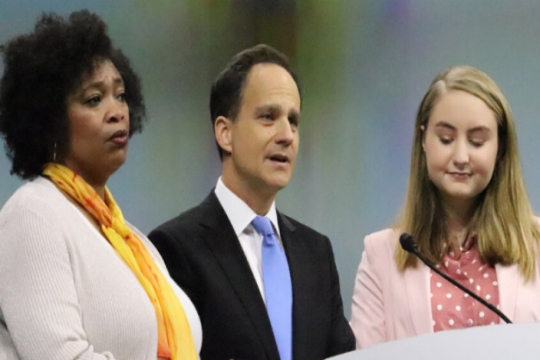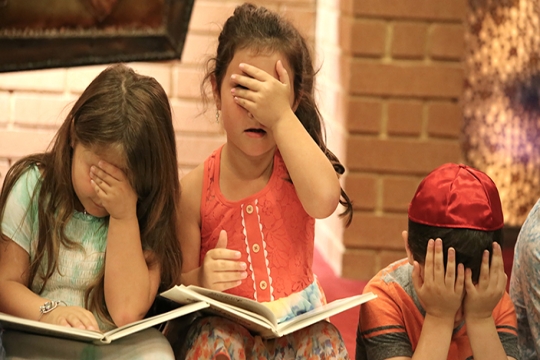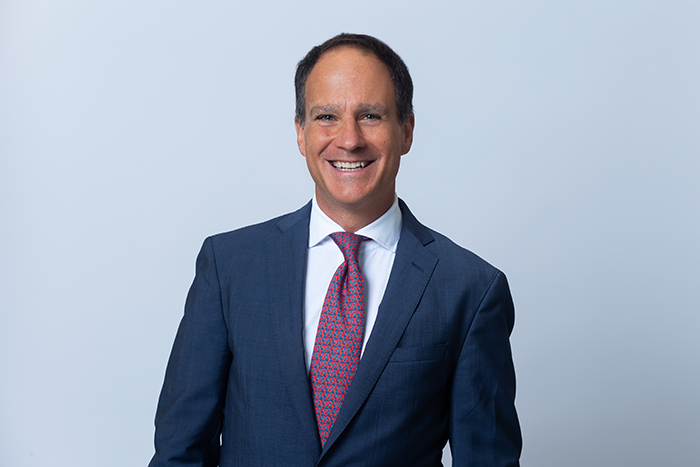[Editor’s note: This d’var was given by Rabbi Jonah Pesner, Senior Vice President of the URJ, on Friday night at the 2013 URJ Biennial.]
Shabbat shalom!
This week we read parashat va-y’chi, taken from the opening verse: “And Jacob lived in Egypt for seventeen years. Va-y’chi, meaning “and he lived” is an ironic name, since the parasha tells the story of Jacob’s death. Nearing his end, he pleads with his son Joseph to return him to the land of his ancestors for burial. He gathers his children to surround him, that he might offer them his final, dying words. Just a few verses later, Joseph also dies, and the book of B’reishit comes to an end.
B’reishit – the book of creation, the story of God forming the universe and breathing life into the first human being ends with death. It is worthy to note, the simple vuv in Hebrew implies “and,” “but,” and “yet” all at the same time! So we read, va-y’chi – “yet he lived.” In other words, the text is signaling us, despite his approaching death; pay attention to his life.
This week we mourn the loss of another great leader, Nelson Mandela. He and Jacob had much in common. Jacob’s birth name means “heel” reflecting his persona as a trickster and imposter. Mandela was born “Rolihlahla” which means “troublemaker.” Like Jacob, Mandela would struggle under the mantle of leadership, and acquire a new name. As Jacob becomes Yisrael, Mandela became “Madiba.” the name of his clan and a symbol of his leadership.
With the deaths of Jacob and Mandela, we are reminded va-y’chi, yet he lived – and we ask: What does it mean to have lived? For life to have had meaning and purpose? Despite their heroic stature, these two men were just that: mortal humans (like us) who lived and died.
President Obama captured this eloquently in his eulogy for Mandela:
It was precisely because he could admit to imperfection – because he could be so full of good humor, even mischief, despite the heavy burdens he carried – that we loved him so. He was not a bust made of marble; he was a man of flesh and blood – a son and husband, a father and a friend. That is why we learned so much from him; that is why we can learn from him still. For nothing he achieved was inevitable. In the arc of his life, we see a man who earned his place in history through struggle and shrewdness; persistence and faith. He tells us what’s possible not just in the pages of dusty history books, but in our own lives as well.
So what does this mean for us?
Recently, a friend explained why he had become more meditative and mindful, and was limiting his very successful professional work to focus more on his family. He had developed an irregular heart beat. Frightened by the strange physical sensation, he thought he might be dying. There is no better reminder of your own mortality, he said, than feeling your own heart beat.
Medical tests showed my friend that he was not in danger. Yet he was moved to change his life, that we might say – “va-y’chi” – yet he lived!
Sefer Bereishit begins with the breath of life, and ends with a final, dying breath. As we reflect on the deaths and lives of Jacob and Mandela, let us hear our own hearts beating. Let us feel our own breathing, knowing we are dying and we are living all at once. This Shabbat, let us revel in the beauty of our lives, the joys of our relationships, and the opportunity we each have to be part of the transformation of the world around us.
At his inauguration as the first democratically elected leader of South Africa, Mandela famously and courageously called for forgiveness and reconciliation. He did so not just for the sake of “nation building,” but in order to “birth a new world”! Mandela understood the classic rabbinic maxim that in every life there is an entire universe; but he also understood that when we individually lead lives of love, forgiveness, and justice, our entire world moves closer to redemption.
Mandela also said, “What counts in life is not the mere fact that we lived. It is the difference we make in the lives of others that will determine the significance of the life we lead.”
Some day, about each one of us it will be said, va-y’chi: “And yet he lived.” “And yet she lived.”
Breathe in.
Breathe out.
Listen to your heart beat.
It is pumping oxygen infused blood, giving your body life and your mind consciousness.
Take in ruach elohim, the divine animating source of life.
With every inhale we take, and with every exhale we share.
And when it stops…
Yet…
We have lived.
Shabbat shalom.
Related Posts

The Shalom Collaboration: How Performing at the URJ Biennial Changed Our Career Trajectory

"What Will You Do at Such a Time as This?"

